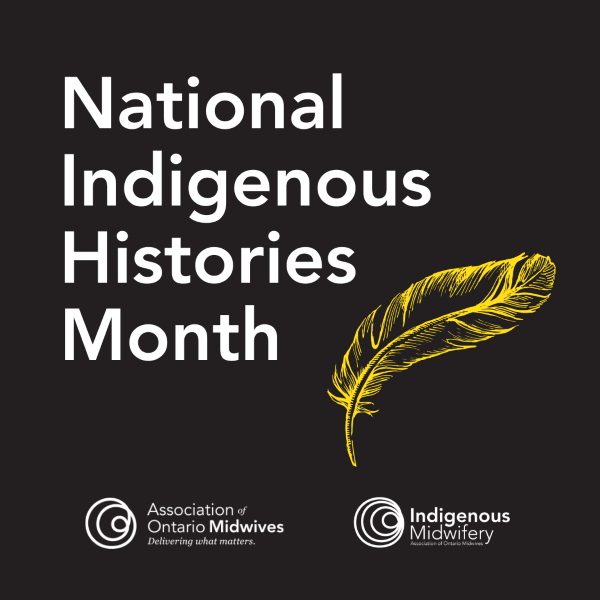National Indigenous Histories Month: Supporting Indigenous midwives in reclaiming birth

June 3, 2025
June marks National Indigenous Histories Month, a time to celebrate the rich cultures and diversity of First Nations, Inuit and Métis peoples, commemorate their ongoing experiences on Turtle Island and meaningfully engage in reconciliation work. The AOM is committed to supporting the restoration and renewal of Indigenous midwifery practices.
The sacred tradition of Indigenous birth
Since time immemorial and up until just a few generations ago, Indigenous babies were born on the land. They were born in their communities, surrounded by culture, ceremony and the wisdom of expert birth workers who carried generations of knowledge about supporting families through the sacred journey of birth. Birth was understood not as a medical event requiring intervention, but as a natural, spiritual process deeply connected to community, land and cultural identity.
Indigenous midwives have always been more than clinical care providers. They were and continue to be knowledge keepers, ceremony holders, community healers, leaders and guardians of traditional practices that nurture both the physical and spiritual well-being of families. Their role extends far beyond the birthing room to encompass nutrition, breastfeeding support, emotional care and the preservation of cultural teachings that strengthen entire nations.
The impact of colonial disruption
Colonization nearly destroyed these sacred birthing traditions. Through systematic policies designed to assimilate Indigenous peoples, traditional birth practices were criminalized, Indigenous midwives were marginalized, and families were forced to conform to Euro-Canadian models of care. The mandatory evacuation of pregnant Indigenous people from their communities to distant hospitals represents one of the most harmful ongoing legacies of these colonial policies.
The effects of this disruption extend far beyond individual birth experiences. When birth is removed from community, families lose access to:
- cultural ceremonies and traditional practices
- extended family support systems
- connection to ancestral lands and teachings
- Indigenous languages and ways of knowing
- traditional medicines and healing practices
- opportunities for knowledge transfer between generations
The resurgence of Indigenous midwifery
Today, Indigenous midwives across Canada are leading a powerful movement to reclaim birth for their communities. In Ontario today, there are over 70 Indigenous midwives working as registered midwives or practicing within the exemption clause. These passionate and committed midwives are transforming reproductive and child health through culturally appropriate care for Indigenous families and communities, and re-awakening Indigenous cultural knowledge and practices.
Moving forward together
The vision of bringing birth home is about restoring Indigenous sovereignty over one of life's most fundamental experiences. It's about healing historical trauma, strengthening families and ensuring that Indigenous babies enter this world surrounded by their culture, language and community's love.
This National Indigenous Histories Month, we invite everyone to reflect on how they can better support Indigenous midwifery and the movement to bring birth home. Together, we can work toward a future where every First Nations, Inuit and Métis family has access to culturally safe, community-based care that honours their traditions while ensuring the highest standards of care.
Join the celebrations
Consider attending an upcoming gathering, such as one of the options on this (non-exhaustive) list:
- June 7: Indigenous Celebration at Harbourfront Centre, Toronto
- June 19-22: Nogojiwanong Indigenous Fringe Festival, Trent University, Peterborough
- June 20-21: Pow Wow at Georgian Bay Native Friendship Centre, Midland
- June 20-22: Soaring Spirit Indigenous Festival and Pow Wow, Battlefield Park, Hamilton
- June 21: Sunrise Ceremony, Toronto City Hall
- June 21: Na-Me-Res Pow Wow, Fort York, Toronto
- June 21: National Indigenous Peoples Day: A night of rhythm, roots and recognition, Celebration Square, Mississauga
- June 21-22: Summer Solstice Indigenous Festival, Wesley Clover Parks, Ottawa
